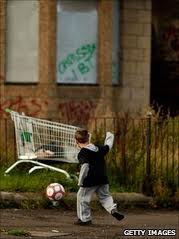
Joint report highlights the impact of cuts to the welfare system.
Some 1.75 million households in Great Britain, including 82,000 in Scotland, have seen their incomes cut in the last three years as a result of welfare reform, a report by Oxfam and the New Policy Institute (NPI) reveals.
The report, Multiple Cuts For The Poorest Families, warns that wide-ranging cuts are changing the shape of welfare support at a time when rising prices are making it harder for families to make ends meet. As a result, job seekers, carers, single parents or those with a disability or illness who are unable to work are being pushed deeper into poverty.
The majority of cuts in Scotland have been related to housing benefits with 54,000 households affected by the under-occupation penalty (bedroom tax), 27,000 households seeing a reduction in the limits on Local Housing Allowance (LHA) and 1,000 households affected by the overall benefit cap.
The Scottish Government recently announced plans to effectively abolish the bedroom tax in Scotland by providing money to offset the reform through the Discretionary Housing Fund. Around £50m is needed to fully offset the impact of the controversial tax and, whilst emergency funding has reached the UK Government’s current cap of £38m, the Scottish Government is awaiting approval from Westminster to provide the remaining £12m to hard-up tenants.
Despite the funding being available, concerns have been raised that households that are entitled to the support have not accessed the fund and continue to build up arrears unnecessarily – suffering stress and anxiety as a result.
Jamie Livingstone, Head of Oxfam Scotland, said: "This is the latest evidence that cuts to our social safety nets, which are supposed to stop people falling further into poverty, have gone too far and are hitting the poorest families hard.
“Little wonder we are seeing people turning to food banks in deeply worrying numbers, with others struggling with rent, council tax, childcare and travel costs to job centres.
“At a time when the five richest families in the UK have the same wealth as the bottom 20 percent of the population it is unacceptable that the poorest are paying such a heavy price.
“We welcome the fact that the Scottish Government is providing help to the poorest households and we call on the UK government to immediately remove the current cap imposed on this funding. This will ensure that people, who need support, get it.
“However we must also ensure that people are aware of their entitlements and councils need to be making sure that available assistance is clearly signposted.”
Across Great Britain a total of 300,000 households have seen a cut in housing benefit, 920,000 have seen a cut in council tax support and 480,000 have seen a cut in both.
In the last year alone, 400,000 households have been pushed further into poverty by cuts to housing benefit or council tax support – households affected by both of these cuts typically lose around £18 per week.
The welfare state provides the very poorest households with a guaranteed income – made up of various benefits - to cover “normal day to day expenses”. Households also get help to pay for the unavoidable costs of council tax and rent. In the last two years the value of the guaranteed income has increased below inflation and cuts to council tax benefit and housing benefit mean that the poorest families have to use the cash-benefit to cover even more costs. This leaves them with less money for the other essentials such as food and fuel.
Tom MacInnes, Research Director at NPI and report author said: “There are two parts to the safety net. One is the means-tested cash benefit such as jobseeker’s allowance, which is rising by less than prices. The other is the benefits that help pay for specific unavoidable costs. This is where cuts have been targeted and where the greatest damage to the safety net is being done.”
Oxfam is calling on the UK Government to determine what the absolute minimum level of support should be for households in different circumstances. It must be high enough to mean that those reliant upon it are not forced to walk the breadline.
Mid Scotland and Fife MSP Claire Baker says measures which were introduced to help people here must go further.


 Man, 44, seriously injured in hospital after crash between Comrie and Rosyth
Man, 44, seriously injured in hospital after crash between Comrie and Rosyth
 John Swinney announces SNP leadership bid
John Swinney announces SNP leadership bid
 Closures on A92 from TONIGHT for roadworks
Closures on A92 from TONIGHT for roadworks
 16°C
16°C
 13°C
13°C